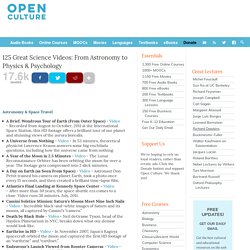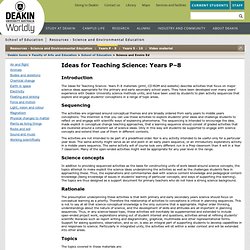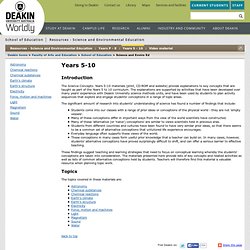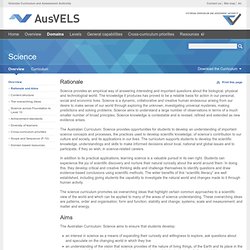

Choose a Showcase - eLearning ICT - DEECD. Science Planning Templates. Lesson Plan Search – Google in Education. Australian Curriculum. Www.nextgenscience.org/sites/ngss/files/Conceptual Shifts in the Next Generation Science Standards POST PUBLIC May Draft.pdf. 125 Great Science Videos: From Astronomy to Physics & Psychology. Astronomy & Space Travel A Brief, Wondrous Tour of Earth (From Outer Space) - Video - Recorded from August to October, 2011 at the International Space Station, this HD footage offers a brilliant tour of our planet and stunning views of the aurora borealis.A Universe from Nothing - Video - In 53 minutes, theoretical physicist Lawrence Krauss answers some big enchilada questions, including how the universe came from nothing.A Year of the Moon in 2.5 Minutes - Video - The Lunar Reconnaissance Orbiter has been orbiting the moon for over a year.

The footage gets compressed into 2 slick minutes.A Day on Earth (as Seen From Space) - Video - Astronaut Don Pettit trained his camera on planet Earth, took a photo once every 15 seconds, and then created a brilliant time-lapse film.Atlantis's Final Landing at Kennedy Space Center - Video - After more than 30 years, the space shuttle era comes to a close. Video runs 30 minutes. Physics Biology & Chemistry Environment, Geology and & Ecology. Resources - Science and Environmental Education. Introduction The Ideas for Teaching Science: Years P–8 materials (print, CD-ROM and website) describe activities that focus on major science ideas appropriate for the primary and early secondary school years.

They have been developed over many years’ experience with Deakin University science methods units, and have been used by students to plan activity sequences that explore and engage students’ conceptions in a range of topic areas. Sequencing The activities are organised around conceptual themes and are broadly ordered from early years to middle years conceptions.
The intention is that you can use these activities to explore students’ prior ideas and challenge students to reflect on and engage with scientific ways of explaining phenomena. The activities are not intended to be part of a predefined order. Science concepts Rationale The presumption underpinning these activities is that both primary and early secondary years science should focus on conceptual learning as a priority. Topics. Resources - Science and Environmental Education. Introduction The Science Concepts: Years 5-10 materials (print, CD-ROM and website) provide explanations to key concepts that are taught as part of the Years 5 to 10 curriculum.

The explanations are supported by activities that have been developed over many years' experience with Deakin University science methods units, and have been used by students to plan activity sequences that explore and engage students' conceptions in a range of topic areas. The significant amount of research into students' understanding of science has found a number of findings that include: Students come into our classes with a range of prior ideas or conceptions of the physical world - they are not 'empty vessels'. Many of these conceptions differ in important ways from the view of the world scientists have constructed. These findings suggest teaching and learning strategies that need to focus on conceptual learning whereby the students' conceptions are taken into consideration. Topics back to top. Victorian Curriculum and Assessment Authority.
Www.vcaa.vic.edu.au/Documents/auscurric/Science_scope_and_sequence_AusVELS.pdf. Science - Rationale and Aims. Rationale Science provides an empirical way of answering interesting and important questions about the biological, physical and technological world.

The knowledge it produces has proved to be a reliable basis for action in our personal, social and economic lives. Science is a dynamic, collaborative and creative human endeavour arising from our desire to make sense of our world through exploring the unknown, investigating universal mysteries, making predictions and solving problems. Science aims to understand a large number of observations in terms of a much smaller number of broad principles. Science knowledge is contestable and is revised, refined and extended as new evidence arises. The Australian Curriculum: Science provides opportunities for students to develop an understanding of important science concepts and processes, the practices used to develop scientific knowledge, of science’s contribution to our culture and society, and its applications in our lives.
Aims. AusVELS - Home.